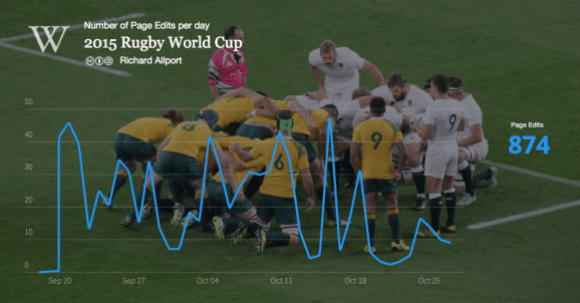
New Zealand, pictured playing against Namibia, are through to their fourth final. Image by sebastian1906, freely licensed under CC BY 2.0.
This year’s Rugby World Cup, the eighth edition of the international rugby union championship, is in full force ahead of the final on October 31. This weekend saw the semifinalists—South Africa, New Zealand, Argentina, and Australia—take to the field at Twickenham in London.
Matches 43 and 44 were played on Saturday and Sunday, respectively, in front of crowds of more than 80,000. New Zealand’s All Blacks played out a tense 20–18 victory over the Springboks of South Africa, with Dan Carter scoring his first drop goal in over three years. The other semifinal was more one-sided; despite a late surge from the Pumas of Argentina, Australia held on to a 29–15 win.
It sets up a fully Australasian final next weekend—and each side became the first and second teams to make four World Cup finals.

Edits made per day to the “2015 Rugby World Cup” article on the English Wikipedia during the tournament. Image by Joe Sutherland, freely licensed under CC BY-SA 4.0.
Wikipedia’s entry on the 2015 edition of the championship has existed since March 2006, when New Zealand resident (but South Africa fan) Arguss wrote an initial blurb suggesting where the tournament might be held. At that time, the 2011 tournament had just been awarded to New Zealand, with the 2015 and 2019 hosts to be announced in 2009.
Arguss was a member of WikiProject Rugby Union, a project dedicated to articles related to the sport with around 170 members at the time of writing. It covers almost 15,000 articles, ten of which are “featured”—the highest level of acclaim an article can have on Wikipedia.
The initial development was, perhaps predictably, quite slow. It was not until England submitted their bid in May 2009 that work on the article sped up; there was a peak of editing in July of 2009, when the bid proved successful. Prawn3944, a user with just over a thousand edits to his name, played a key role in updating the article following the announcement from the International Rugby Board.
Since then, the vast majority of the 2,220 edits made to the article have been while the tournament has been on. Almost 900 edits have so far been made to the article since the competition began on September 18. It’s proven popular with readers, too. While the tournament has been ongoing, the article has received more than one million views in total.
The final, also to be played at Twickenham, naturally has an article of its own, documenting each team’s journey to the final from the group stage through knockouts. It will likely see a flurry of enthusiastic rugby fans descend upon it to announce the 2015 Rugby World Cup champions on October 31.
Other headlines
- This week, the Pacific region experienced its most intense tropical cyclone ever recorded in the form of Hurricane Patricia. Originating in the Gulf of Tehuantepec in mid-October, Patricia developed relatively slowly. Eventually, it became the twenty-fourth named storm of the annual hurricane season. Despite fears it would cause substantial damage and casualties in Mexico, it caused a comparatively small $189 million worth of damage and eight direct fatalities.
- In south Asia, a magnitude 7.5 earthquake struck in northern Afghanistan at 13:39 local time on October 26. It was felt as far away as New Delhi in India, and resulted in at least 367 deaths, injuring some 2,200 others, mostly in Pakistan. The toll is lower than that of the last major earthquake of similar magnitude in the Kashmir region, which killed more than 87,000 people in 2005.
- In Formula One, British driver Lewis Hamilton won the World Drivers’ Championship, following his victory in a very wet and eventful United States Grand Prix. His team, Mercedes, took the Constructors’ Championship.
- A masked assailant armed with a sword attacked a school in Trollhättan, a small town in western Sweden, on October 22. He killed a teaching assistant and a male student, and was eventually shot to death by police. The motive is thought to have been racism.
- The European Union greenlit plans to abolish roaming charges within member states by 2017, with caps set to be implemented in April 2016.
Joe SutherlandCommunications Intern
Wikimedia Foundation

Can you help us translate this article?
In order for this article to reach as many people as possible we would like your help. Can you translate this article to get the message out?
Start translation
